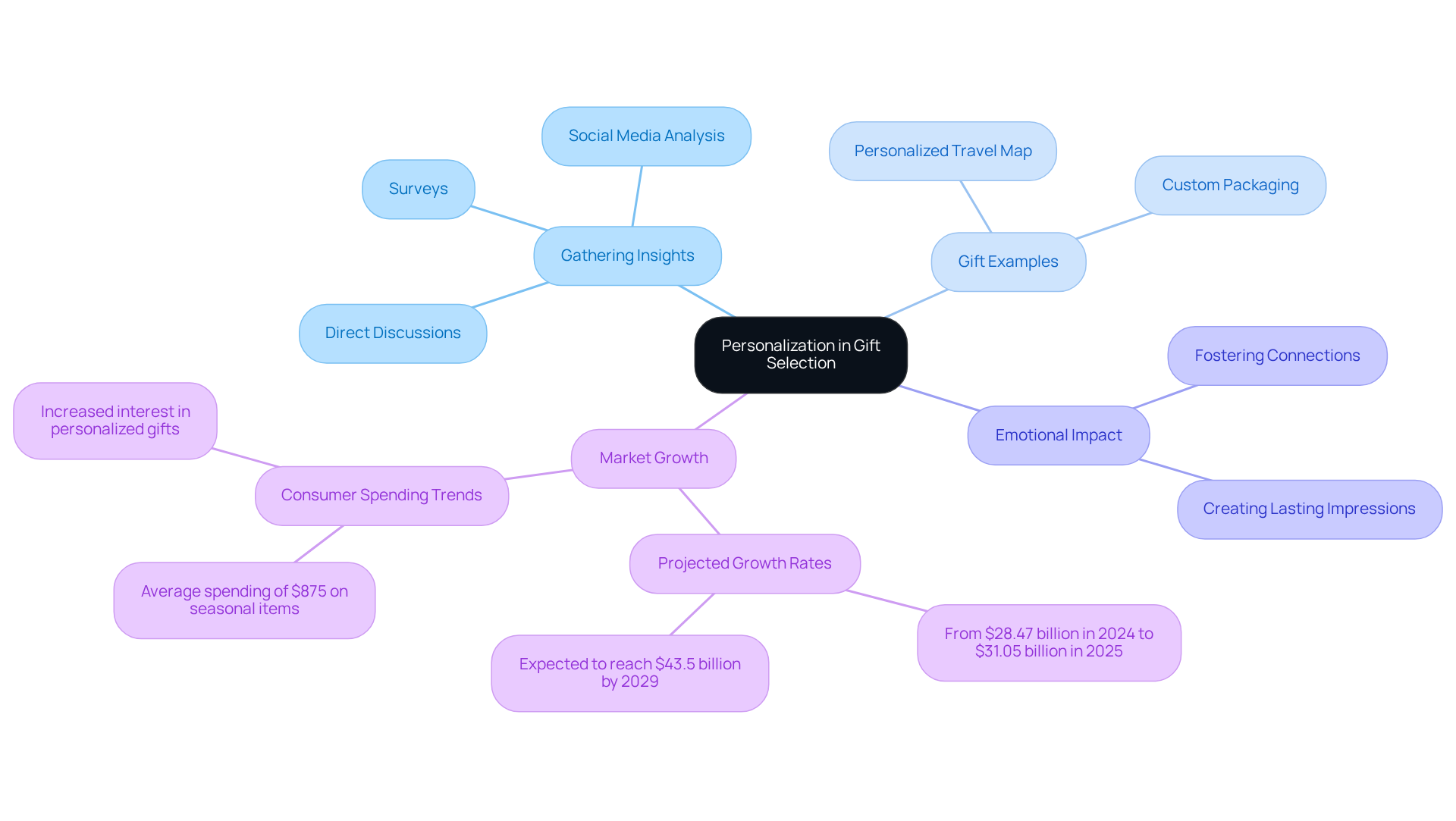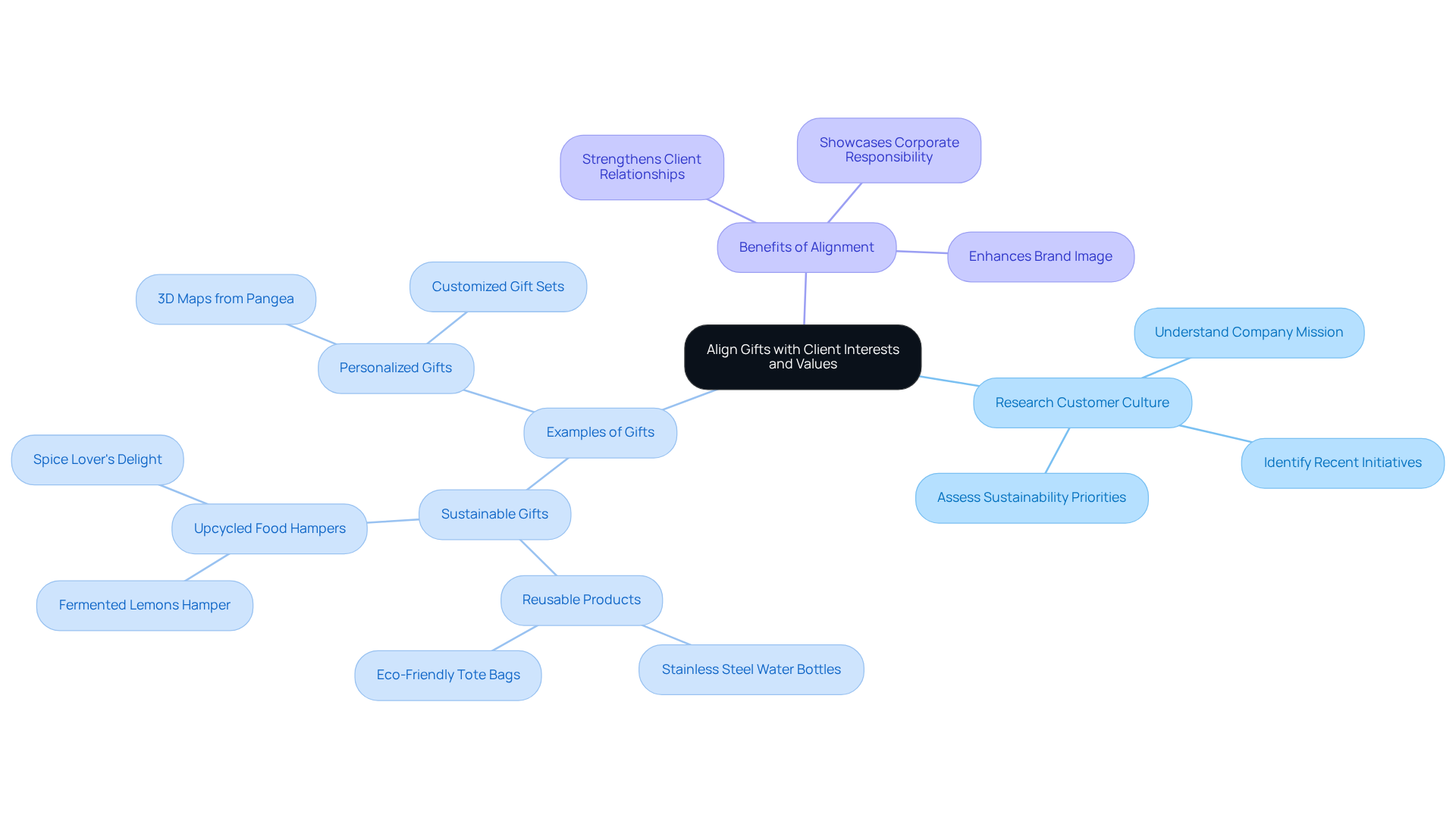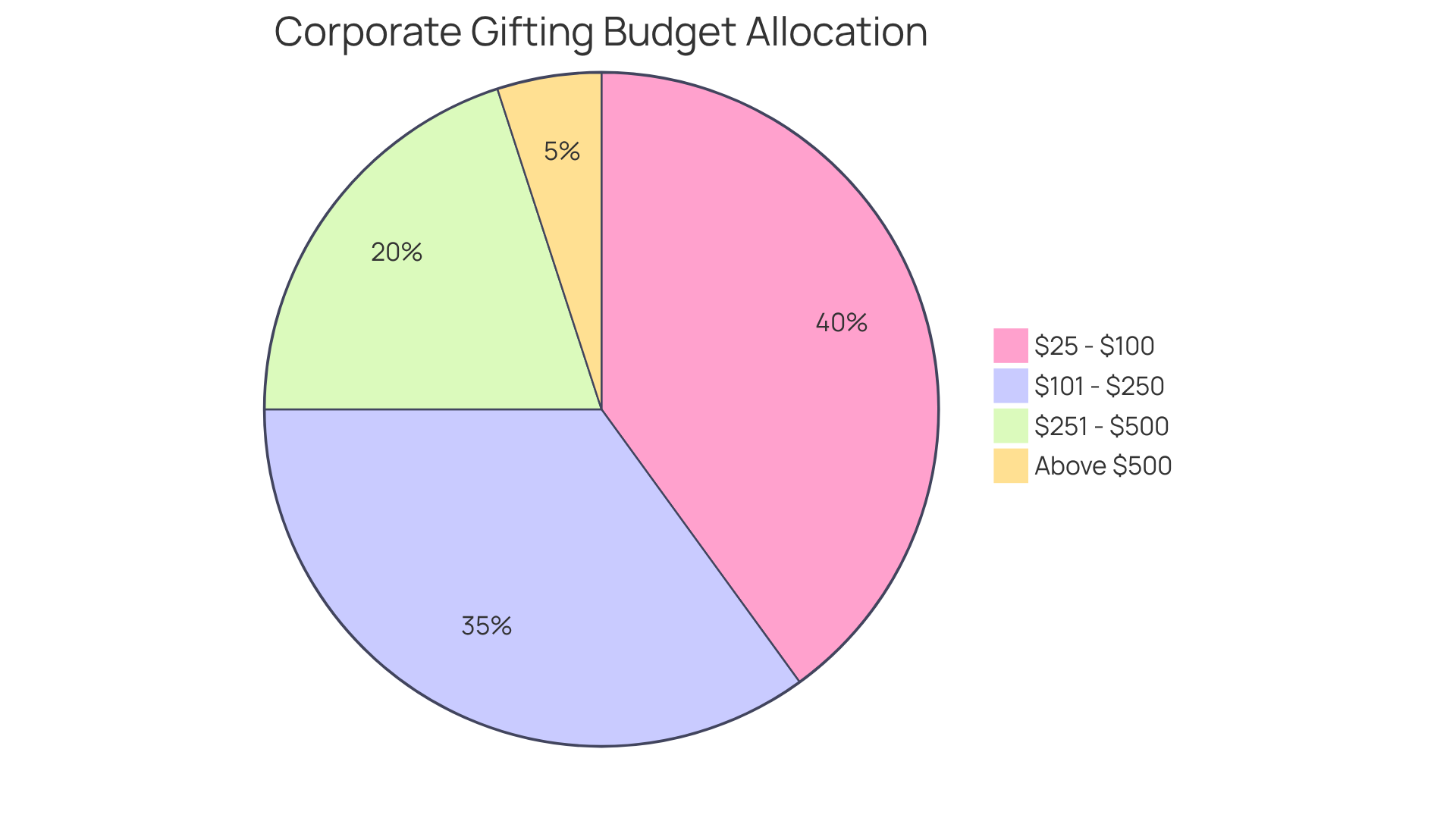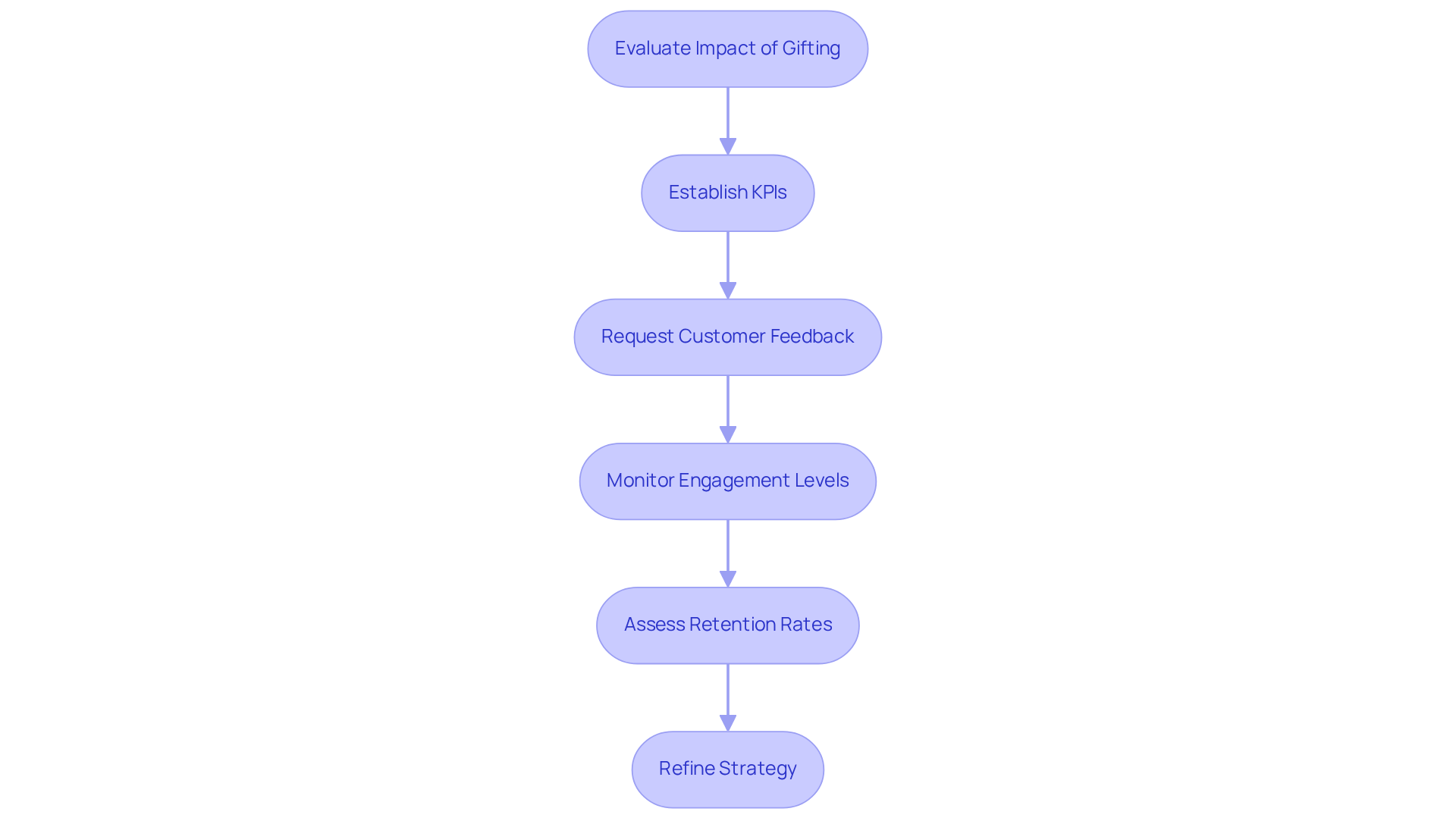Overview
The article delineates four pivotal strategies for selecting meaningful client gifts, emphasizing:
- Personalization
- Alignment with client interests and values
- Budget management
- Evaluation of impacts on client relationships
Each strategy is bolstered by practical examples and data, underscoring that personalized gifts not only foster deeper connections but also enhance client loyalty, ultimately leading to stronger business relationships.
Introduction
In a competitive business landscape, where differentiation is paramount, the art of client gifting stands out as a critical strategy for cultivating meaningful connections. Choosing the right gift transcends obligation; it presents an opportunity to demonstrate thoughtfulness and strengthen relationships. Yet, with a wide array of client preferences and budgetary limitations, how can organizations ensure their gifts resonate on a personal level?
This article delves into effective strategies for selecting meaningful client gifts, underscoring the significance of:
- Personalization
- Alignment with client values
- Prudent budget management
- The profound impact that thoughtful gifting can have on business relationships.
Prioritize Personalization in Gift Selection
To effectively prioritize personalization in client gifts, begin by gathering insights into your customers' interests, hobbies, and preferences. This can be achieved through direct discussions, social media analysis, or customer surveys. For example, if a client has a passion for outdoor activities, consider gifting them a personalized travel map from Pangea Maps that highlights their favorite hiking trails. Each map is handcrafted with care using the highest grade 1.5mm birch plywood, topped with white acrylic, and features unique hand sketches over bathymetry, capturing significant stories and memories in a distinctive way. The materials are environmentally sourced, ensuring sustainability in every piece.
Incorporating personal touches, such as a handwritten note or custom packaging, can amplify the emotional effect of the present. Personalization not only demonstrates thoughtfulness but also fosters deeper connections, leading to stronger business relationships, improved client loyalty, and the importance of a client gift. In fact, studies indicate that 80% of consumers are more likely to engage with brands that provide personalized experiences, emphasizing the significance of customizing client gifts to individual preferences.
Furthermore, the customized items market is anticipated to expand from $28.47 billion in 2024 to $31.05 billion in 2025 at a CAGR of 9.1%, highlighting the rising demand for personalized presenting solutions. By making customers feel appreciated and comprehended, you can create enduring impressions that resonate well beyond the initial offering.

Align Gifts with Client Interests and Values
To effectively align client gifts with customer interests and values, conducting comprehensive research into the customer's company culture, mission, and recent initiatives is essential. If a customer prioritizes sustainability, for instance, consider a client gift that includes environmentally friendly items such as reusable products or artisan-crafted goods sourced from local enterprises. A standout option is a personalized 3D map from Pangea Maps, which can highlight their headquarters or a significant project. This distinctive offering not only demonstrates an understanding of the customer's values but also positions your brand as one that shares similar principles, thereby fostering a deeper connection. By choosing client gifts that align with customers' dedication to sustainability and community, companies can strengthen connections and showcase authentic corporate responsibility. Inquire today to explore how personalized gifts can enhance your corporate gifting strategy.

Manage Budget Constraints While Sourcing Unique Gifts
Successfully navigating budget constraints while selecting unique gifts begins with establishing a defined budget for each recipient or occasion. Typically, businesses allocate between 1-3% of their revenue to corporate gifting, with budgets ranging from $25 to $500, depending on customer value and engagement duration.
To optimize impact without exceeding financial limits, explore bulk purchasing options or partner with local artisans, which can yield distinctive items at a reduced cost. For example, Pangea Maps offers customizable 3D maps, handcrafted with care over bathymetry and constructed from premium 1.5mm birch ply, topped with white acrylic. These maps can be tailored to fit various budgets, allowing you to select a design that resonates with the customer while remaining cost-effective.
Furthermore, incorporating experiential gifts—such as passes to local events or workshops—can often be more budget-friendly and provide memorable experiences that strengthen connections. This strategy not only enhances the perceived value of the gift but also aligns with the growing trend of personalization in corporate gifting, which has been shown to foster meaningful connections and lasting relationships.
In fact, 70% of companies report that gifting enhances relationships with customers and associates, underscoring the importance of thoughtful gifting strategies.

Evaluate the Impact of Gifting on Client Relationships
To effectively evaluate the influence of presenting on customer relationships, establishing key performance indicators (KPIs) such as feedback, engagement levels, and retention rates is essential.
After every distribution campaign, proactively request input from customers to understand their responses and gather insights on the reception of the items.
For instance, when customers express gratitude for a client gift, it signifies a successful approach that merits continuation.
Moreover, monitoring changes in customer involvement or recommendations following client gift initiatives can yield critical information regarding the effectiveness of your efforts.
Continuous assessment and refinement of your approach will ensure that your strategy for client gifts remains relevant and impactful.
Ultimately, this commitment enhances client satisfaction and loyalty, prompting you to take action in optimizing your strategies.

Conclusion
Prioritizing meaningful client gift selection is essential in cultivating strong business relationships and demonstrating genuine appreciation. By focusing on personalization, aligning gifts with client values, managing budgets effectively, and evaluating the impact of gifting, businesses can create memorable experiences that resonate deeply with clients.
The article highlights four key strategies:
- The importance of personalized gifts that reflect individual interests.
- The necessity of aligning gifts with clients' values.
- The management of budget constraints while sourcing unique items.
- The evaluation of gifting effectiveness through customer feedback.
Each strategy emphasizes the need for thoughtful consideration in gift selection, ensuring that the gifts not only meet expectations but also foster lasting connections.
Ultimately, the approach to client gifting should be intentional and strategic. By investing time and resources into understanding clients and crafting personalized experiences, businesses can enhance loyalty, satisfaction, and engagement. Embracing these strategies will not only improve client relationships but also position companies as thoughtful partners in their clients' journeys, reinforcing the significance of meaningful gifting in the corporate landscape.
Frequently Asked Questions
How can I prioritize personalization in client gift selection?
To prioritize personalization, gather insights into your customers' interests, hobbies, and preferences through direct discussions, social media analysis, or customer surveys.
Can you give an example of a personalized gift?
A personalized gift example is a travel map from Pangea Maps that highlights a client's favorite hiking trails, handcrafted from environmentally sourced birch plywood and featuring unique hand sketches.
What materials are used in the personalized travel maps?
The travel maps are made from 1.5mm birch plywood, topped with white acrylic, and feature unique hand sketches over bathymetry.
What additional touches can enhance the emotional effect of a gift?
Incorporating personal touches such as a handwritten note or custom packaging can amplify the emotional impact of the gift.
Why is personalization important in client gifts?
Personalization demonstrates thoughtfulness, fosters deeper connections, strengthens business relationships, and improves client loyalty.
What do studies say about consumer engagement with personalized experiences?
Studies indicate that 80% of consumers are more likely to engage with brands that provide personalized experiences.
What is the projected growth of the customized items market?
The customized items market is projected to expand from $28.47 billion in 2024 to $31.05 billion in 2025, with a CAGR of 9.1%.
How does personalization impact customer appreciation?
Personalization makes customers feel appreciated and understood, creating enduring impressions that resonate well beyond the initial gift.


